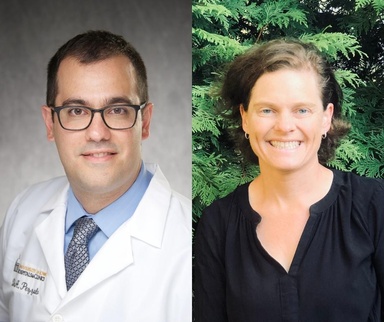Two University of Iowa faculty members have been awarded Williams-Cannon Faculty Fellowships through the Iowa Neuroscience Institute. Alejandro Pezzulo, MD, assistant professor of internal medicine, and Michelle Voss, PhD, associate professor of psychological and brain sciences, will each receive $45,000 in research funding.
Created through a gift to the UI Center for Advancement from Sue and Frank Cannon, the fellowships support faculty research in neurodegeneration. Both Pezzulo and Voss are working to develop earlier interventions or preventative measures against neurodegenerative disease.

Pezzulo is a pulmonologist who is working to understand “disease susceptibility,” or why some people, despite living in similar environments or conditions, develop chronic diseases whereas others do not. He believes that understanding disease susceptibility will transform research and clinical care for neurodegenerative diseases because it will allow for earlier interventions and treatments. Pezzulo’s lab has created a method involving minimally invasive collection of cells from patients (through nasal brushing or skin biopsy.) The cells are exposed to hundreds of “stressors” under controlled conditions, and the team measures the responses of more than 20,000 genes to each stressor simultaneously. They look for responses to stressors that occur only in people with disease and use those to test for early susceptibility, identify disease mechanisms, and point to possible therapeutic targets. The fellowship will support the application of this unique method to samples recently obtained from people with Parkinson’s disease and healthy matched controls.
Voss’s research program is focused on bridging an understanding of how the human brain makes and retrieves memories with how these processes are affected by aging. She is working toward testing behavioral interventions to slow or prevent age-related memory loss. Evidence from animal models of aging and Alzheimer’s disease continue to support the potential of physical exercise for slowing the spread of neurodegenerative pathology and slowing memory decline. The fellowship will support Voss’ study of blood-based biomarkers of genetic risk for earlier and more severe Alzheimer’s pathology. Her goal is a fuller understanding of how and for whom physical exercise training can counteract Alzheimer’s-related neuropathology and associated memory loss. Voss envisions this work translating to guidelines for how we should change our day-to-day physical activity to maintain our memory at its personal best throughout life.
The Cannons’ gift and their passion to support research stems from seeing their loved ones affected by Alzheimer’s disease. They are committed to helping Iowa researchers in the study of Alzheimer’s and similar diseases, with the goal of better outcomes and therapies for patients and families.